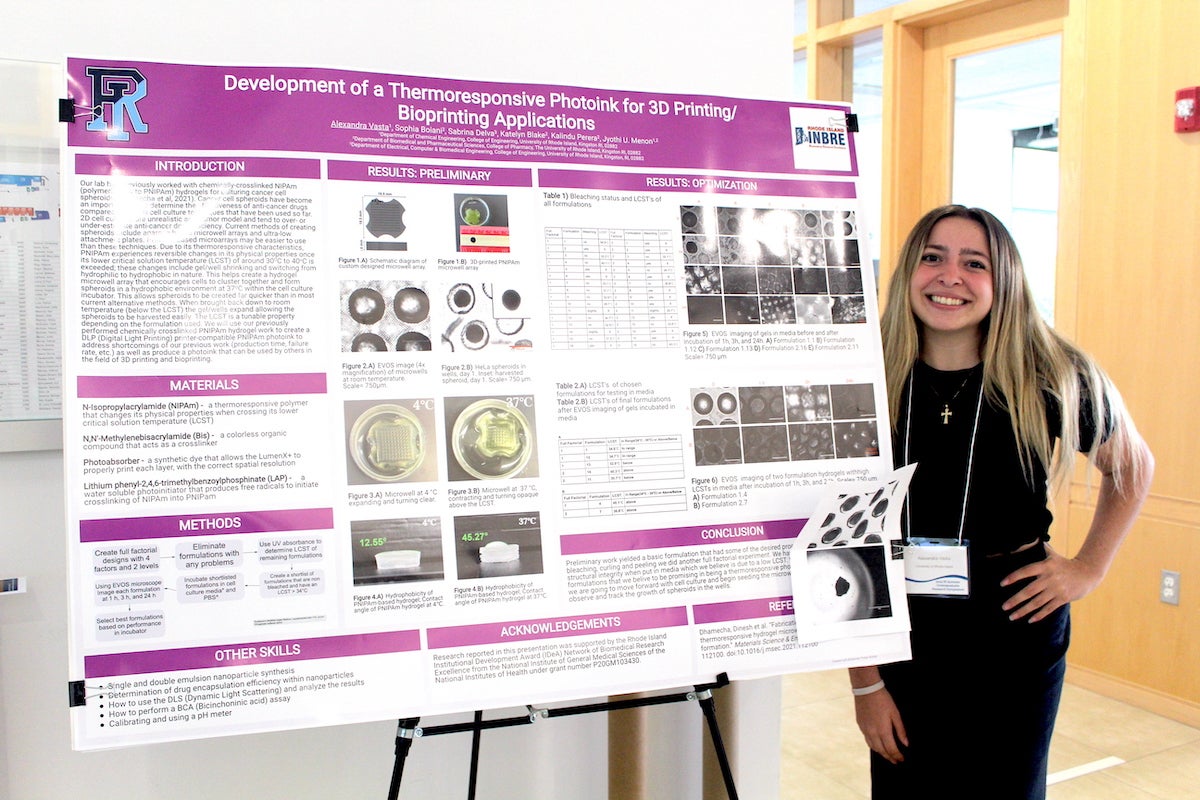Pharmacy students’ research projects prominent at 15th annual undergraduate R.I. Summer Research Symposium
The state’s flagship research institution, the University of Rhode Island, offers several research opportunities for undergraduate students, a virtual alphabet soup of intellectual possibility: SURF, EPSCoR, RI-INBRE, MARC U*STAR, and more. These acronyms all spell opportunity for motivated undergraduate students to contribute breakthrough research at the University, working alongside experts on projects that can make a difference in the world.
The Rhode Island Summer Research Symposium also provides undergraduate students from around the state with the opportunity to showcase their research findings to the larger scientific community. More than 180 students presented recently at the annual summer symposium, drawing several faculty members and administrators from local colleges and universities to URI’s Kingston campus.
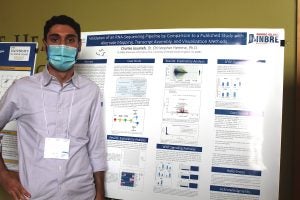
The RI-INBRE program started in 2001 and the poster symposium began in 2004, with students from URI’s RI-INBRE Summer Undergraduate Research Fellowship (SURF). Over the years, the SURF program and symposium opened to students from other institutions in Rhode Island. The poster presentations are usually held the last Friday in July, capping the 10-week RI-INBRE SURF program. Students do not need research experience coming into the program, but gain skills and confidence in their abilities before it ends.
URI President Marc Parlange welcomed students and guests at the start of this year’s symposium. Parlange recalled his days as an undergraduate in Australia, noting how opportunities like this help students decide what to do in their lives. In Parlange’s case, that undergraduate experience led him to graduate school and, eventually, the University of Rhode Island.
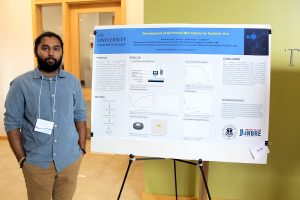
“Research can be a hard slog, with plenty of dead ends,” Parlange, a recognized expert and researcher in environmental fluid mechanics, said with a chuckle. “But science today is so much more collaborative and team-oriented. It’s a beautiful thing to have the opportunity to do research. Research is one of the highest forms of learning and so needed in the world right now.”
For many of the faculty who attended the symposium, the event was one of their favorite days of the summer, celebrating hard work, solid science, good questions and intellectual curiosity.
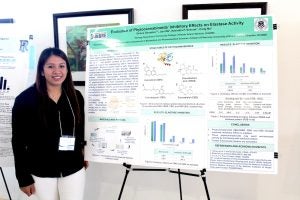
Matthew Bertin, assistant professor in URI’s College of Pharmacy and a mentor in RI-INBRE SURF, said close mentoring relationships are one of the primary benefits for students in these programs. He hopes to impart enthusiasm and an awe of natural processes to students: “That’s why I loved science as a kid and why I continue to love it as a faculty member. I also like to emphasize the nature of discovery, the rigor necessary to understand a reproducible observation, and the fact that we are the first people on earth observing the natural phenomenon we are studying — even if it seems like a small deal at the time. When we discover a new molecule, we are the first people to ever see what it looks like!”
Biologist and professor emeritus at Kentucky Wesleyan College Dr. Paula Dehn serves on the External Advisory Committee for RI-INBRE (Rhode Island IDeA Network of Biomedical Research Excellence). Dehn called the day “exciting. It’s the best thing you can do, working with the next generation.”
A record 450-plus students, faculty, family and friends attended this summer’s symposium.
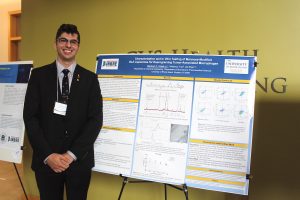
Leading up to their poster presentations, the students worked 30-40 hours per week on their projects, learning how to construct a study, form and test a hypothesis, and handle the inevitable roadblocks. Students also learned to use high-end instrumentation and performed research experiments, while attending several professional development activities.
To date, more than 1,100 undergraduates have received hands-on research training through the RI-INBRE network. RI-INBRE has a statewide grant award from the National Institutes of Health and as of 2024, will have brought about $81 million into the state. The program partners with network institutions across the state (CCRI, Brown, Bryant, JWU, PC, RIC, RWU, Salve and URI) to provide funding to junior faculty investigators for research and to train the next generation of biomedical scientists.
For many students participating in the programs, the experience can be transformational.
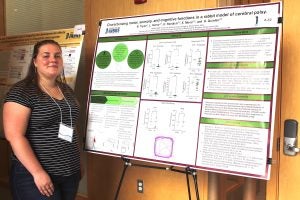 Alexandra Vasta, a chemical engineering and Italian major in URI’s International Engineering Program, researched a thermoresponsive photoink for 3D printers and bioprinters this summer, using the photoink to seed cancer cells. Forming 3D spheroids can help assess cancer drugs more effectively and pave the way for more efficient anticancer drugs, a marked improvement over the traditional molds previously used for this kind of research, which had a long development time and high failure rate.
Alexandra Vasta, a chemical engineering and Italian major in URI’s International Engineering Program, researched a thermoresponsive photoink for 3D printers and bioprinters this summer, using the photoink to seed cancer cells. Forming 3D spheroids can help assess cancer drugs more effectively and pave the way for more efficient anticancer drugs, a marked improvement over the traditional molds previously used for this kind of research, which had a long development time and high failure rate.
Ribosomes came into focus under the microscope of Kamila Guerra, a cellular and molecular biology major, who came to URI unfamiliar with research; now she’s looking forward to starting applications for medical school this year, with this experience in her portfolio. “It’s an incredible opportunity,” she said.
Pharmacy Ph.D. candidate Rebecca O’Toole said presenting her research gave her the opportunity to improve her communication skills on a topic she’s passionate about, antimicrobial research to improve patient outcomes, while Anna Cetera said the experience helped her consider a new post-graduation career path. A first-generation college student, Cetera’s research in neural engineering helped her realize her potential to not only achieve her bachelor’s degree, but go beyond. She is looking forward to attending graduate school to continue biomedical research and hopes to become a mentor herself someday.
Many students also enjoyed the chance to join peers from other colleges across the state. Working through the challenges of research led to a sense of shared work and community, even if the students pursued their research separately. “I felt like I was a part of something bigger,” O’Toole said.
If the lab is a solitary environment, presenting one’s research is a highly interactive experience, as students presented their work and answered questions from peers and visitors. The poster symposium almost had the exciting feel of a movie debut, with selfies and photos being taken inside and out, by students and faculty alike. Promising research took the starring role.
Sharing their research this way is not only a celebration of weeks of work, but helps students learn how to translate their findings to new audiences. Working with mentors, students gain technical knowledge and acquire important soft skills that researchers need to be successful.
Plans are already underway for next year’s programs.
“We encourage everyone to apply,” said Laura Arrighi, RI-INBRE program assistant. “This is an inclusive program and we always welcome mentors, too.”
The programs are open to undergraduate students from any college. Applications for the programs open in January and are due in February. Learn more.

